杭州师范大学2014年《241二外德语》考研专业课真题试卷
- 格式:pdf
- 大小:338.15 KB
- 文档页数:9
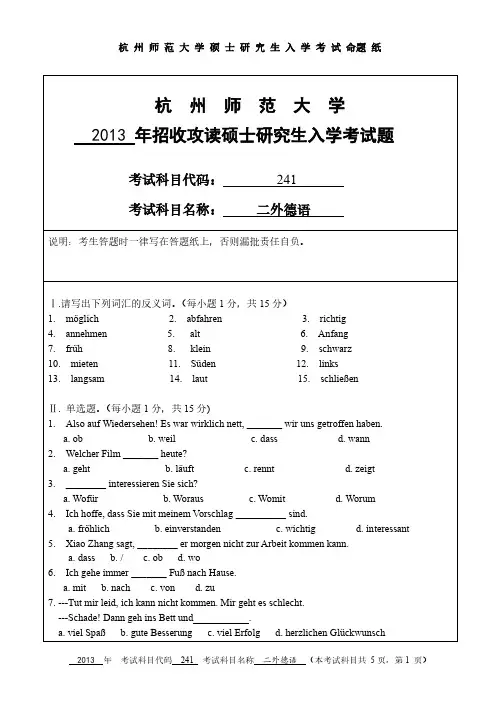
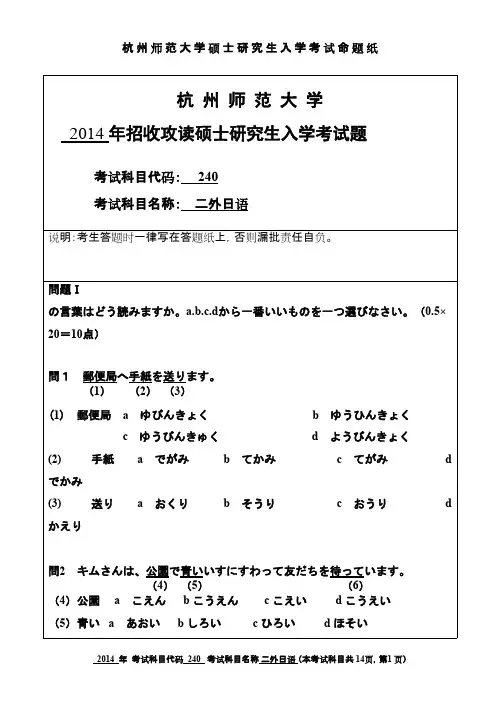
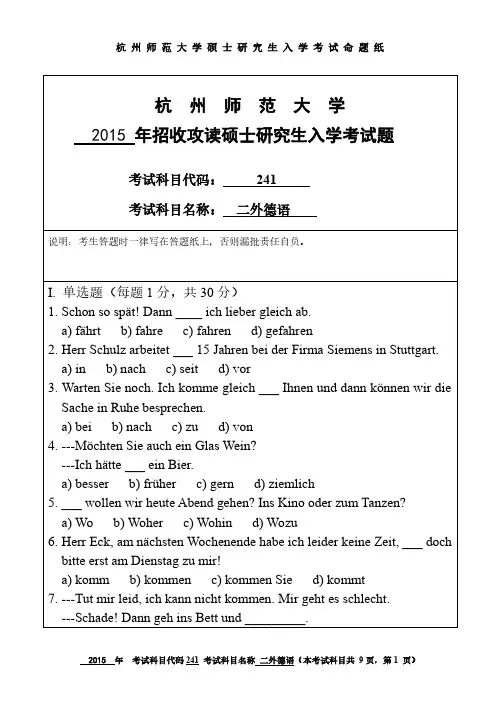
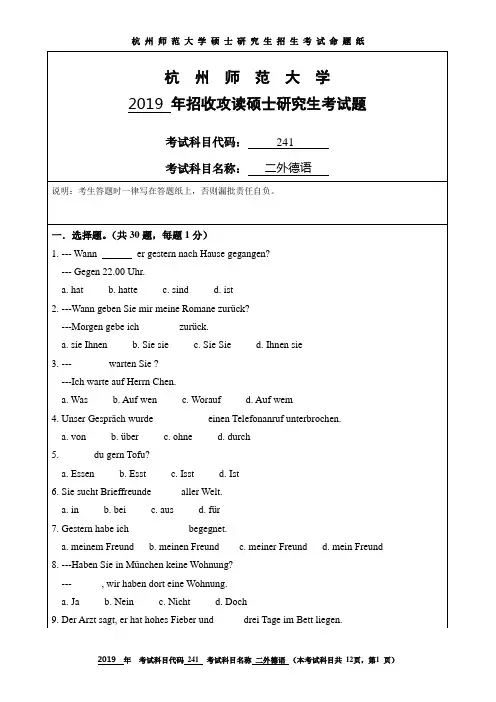

初试德语水平1.单选(一共十道,有七八个是词义辨析,记得有一个是absehen 和übersehen还有什么sehen 诸如此类,大部分词都可以在高德课本上找到,但是不仅限于课本上的词义辨析)2.填空(填关系代词der, deren,denen等,记忆中我填了好几个deren)3.填连词(记得有obwohl, nachdem,)4.介词填空5.连线(熟语,有关身体部位的)6.选词填空(一共两篇,每篇都给出十个词,动词,名词,形容词都有,注意形式)7.用连词把两个句子连成一个句子(比如Es gibt einen Tisch. Auf dem Tisch steht eine Flasche.)8.直陈式改虚拟式(7、8题虽然很简单,但是题目很多,我记得这两个题我就写了三四页)9.阅读第一篇(只记得是有个人想刺杀希特勒)(1)判断(2)解释几个文中出现的单词还有(3)(4)想不起来了第二篇(关于某个哲学家的)判断翻译写作1.德译汉(文学方面,只记得有个人叫Sabine,穿过车水马龙的人群,走进一家咖啡厅.....凝望窗外.....)2.汉译德(北岛《父亲》节选)自八十年代起,我和父亲的地位颠倒过来——他对我几乎言听计从,至少口是心非。
我们从未真正平等过,有时我多想跟他成为朋友,说说心里话什么的,但发现这不可能。
其实,几乎每个中国男人心中都有个小暴君,且角色复杂:在社会上小暴君基本是衙役顺民,不越雷池一步,“人阔脸就变”,对手下对百姓心狠手毒,这在历代造反者身上尤其明显,关键是转换自如,无须过渡;在家中小暴君必是主宰,无平等可言,不仅老婆孩子,甚至连男主人都在其股掌中。
直到我成为父亲,才意识到这暴君意识来自血液来自文化深处,根深蒂固,离经叛道者如我也在所难逃。
回望父亲的人生道路,我辨认出自己的足迹,亦步亦趋,交错重合——这一发现让我震惊。
3 作文(人文科学的意义>400词)复试笔试(语言学)给出一篇文章(EinTraumwurdewahr)(1)写出七个以上的德语词类名称,用文中单词举例(10分)(2)写出文中单词用到的构词法,举例,说明如何构成的(10分)(3)选了文章的第三段,翻译成汉语,并比较汉语和德语的区别(用完整句子,至少三个区别)(4)分析文章的Perspektive写作视角(50分)面试(文学)阐释Kafka的寓言《猫和鼠》,进去之前会把寓言给你,前一个同学的考试时间就是自己的准备时间,(1)Stellen Sie sich kurz vor(2)Intepretieren Sie die Fabel(3)大学期间是否度过Kafka的作品(4)是否学过文学相关课程(5)针对你对寓言的阐释问几个问题,比如为什么这样看,你认为寓言中猫和鼠象征什么,为什么等等(其实可能是因为我本身对寓言的理解就是完全错误的,教授才会那么问我,对我做了很多引导,但是最终我还是没理解,他就说了一句,回家再慢慢想吧)(6)可以出去了,叫下一位。
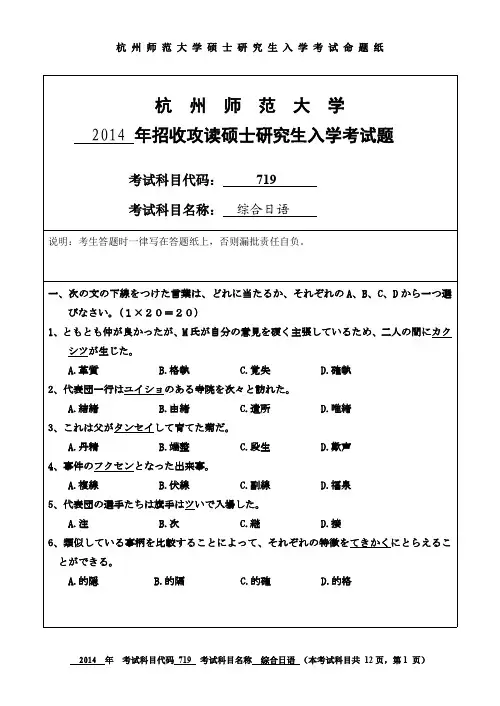
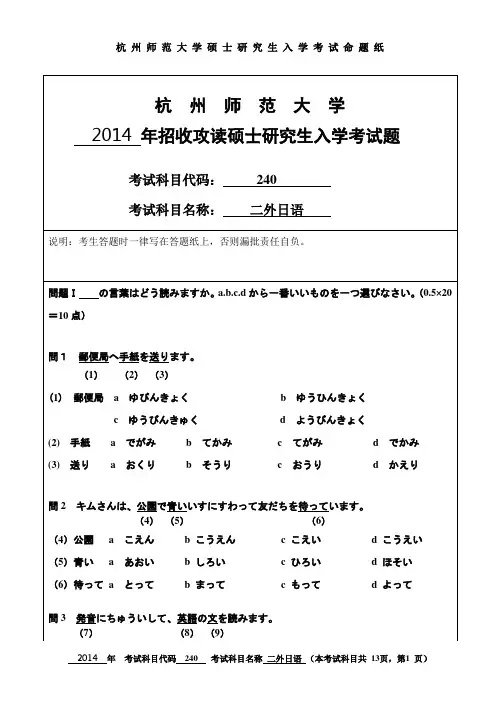
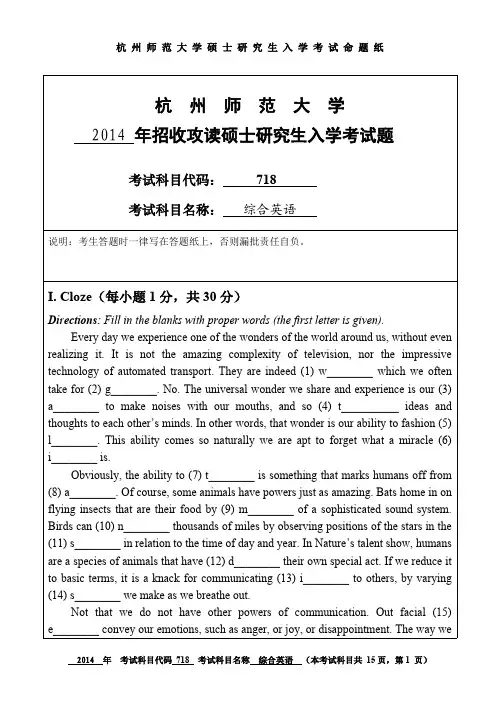
杭州师范大学2014年招收攻读硕士研究生入学考试题考试科目代码:718考试科目名称:综合英语说明:考生答题时一律写在答题纸上,否则漏批责任自负。
I. Cloze(每小题1分,共30分)Directions: Fill in the blanks with proper words (the first letter is given).Every day we experience one of the wonders of the world around us, without even realizing it. It is not the amazing complexity of television, nor the impressive technology of automated transport. They are indeed (1) w________ which we often take for (2) g________. No. The universal wonder we share and experience is our (3) a________ to make noises with our mouths, and so (4) t__________ ideas and thoughts to each other’s minds. In other words, that wonder is our ability to fashion (5) l________. This ability comes so naturally we are apt to forget what a miracle (6) i________ is.Obviously, the ability to (7) t________ is something that marks humans off from (8) a________. Of course, some animals have powers just as amazing. Bats home in on flying insects that are their food by (9) m________ of a sophisticated sound system. Birds can (10) n________ thousands of miles by observing positions of the stars in the (11) s________ in relation to the time of day and year. In Nature’s talent show, humans are a species of animals that have (12) d________ their own special act. If we reduce it to basic terms, it is a knack for communicating (13) i________ to others, by varying (14) s________ we make as we breathe out.Not that we do not have other powers of communication. Out facial (15) e________ convey our emotions, such as anger, or joy, or disappointment. The way wehold our heads can (16) i________ to others (17) w________ we are happy or downcast. This is so-called “(18) b________ language”, and to some (19) e________ we are no different from other animals in this (20) r________. Bristling fur is an unmistakable warning of aggression among many (21) c________. Similarly, the bowed head or drooping tail shows a readiness to (22) t________ second place in any animal gathering.Such a means of (23) c________ is a basic mechanism that animals, including human beings, (24) i________ acquire and display. Is the ability to speak just another sort of instinct? If so, how did human beings (25) a________ this amazing skill? Biologists can readily indicate that particular area of our (26) b________ where speech mechanisms (27) f________, but this doesn’t tell us how that (28) p________ of our bodies originated in our biological history. It is (29) t________ to think that for our human ancestors acquiring the power of speech was all a (30) m________ of competition.II. Reading Comprehension (每小题2分,共60分)Directions:There are 6 passages in this section. Each passage is followed by some questions or unfinished statements. For each of them there are four choices marked A), B), C), and D). You should decide on the best choice and write the corresponding letter on the answer sheet.Questions 1 to 5 are based on the following passage:One of the first men to make a commercial success of food conservation was Henry John Heinz. In 1869 he founded a company in Pittsburgh, USA. Like other Americans of his generation, Heinz made his name a household word throughout the western world. At last, man seems to have discovered how to preserve food without considerably altering its taste. The tins of food (Heinz tins!) which Captain Scott abandoned in the Antarctic were opened 47 years after his death, and the contents were not only edible, but pleasant.The main argument against conserved foods is not that the canning of food makes it taste different; rather, people complain that the recipes which the canning chefs dream up are tedious or tasteless. But any recipe is tedious or tasteless if it is eaten in great quantities. And a company like Heinz can only produce something if it is going to be eaten in great quantities. The tomato is very pleasant to eat when it is freshly picked.A regular diet of tomatoes alone could well prove tedious. The canning companies try to cook the tomato in as many ways as possible. The Heinz factories in Britain use millions and millions of tomatoes every year.There are many people who do not like to eat food out of season. They like their food to be fresh, and they like to cook it themselves in “the old-fashioned way”. It is very difficult for modern man to realize what it is like to live without the advantages of pre-packaged and canned food. European society in its present form could not cope without modern methods of food processing. Imagine your local supermarket without all the cans of pre-packaged foods. The supermarket would turn into a chaos of rotten vegetables, stale bread and unhealthy meat. The health problems would be insurmountable, unless we all went into the country to support ourselves.So next time you reject canned food as being tasteless or unimaginative, remember that you can only afford to eat fresh food because canned food exists.1. In which way was Henry John Heinz successful?[A] He achieved a commercial success of food preservation.[B] He sold his home-made food to Captain Scott.[C] Divisions of his company were extended throughout the world.[D] He sailed around the world and reached the Antarctic.2. The main disadvantage of conserved food is __________.[A] the alteration in taste[B] the relatively high price[C] the mass-production[D] the tedious or tasteless recipes3. Why do some people especially dislike canned food?[A] They know how to preserve food in their own way.[B] They like food freshly picked.[C] They dislike foods that are made to a traditional recipe.[D] They do not like canning chefs.4. What would happen if there were no canned food?[A] The modern society would not function properly.[B] Health problems would never be solved.[C] People would have no food supply and starve to death.[D] Foods in the supermarket would become stale.5. What is the writer’s attitude toward canned food?[A] Approving.[B] Negative.[C] Indifferent.[D] Neutral.Questions 6 to 10 are based on the following passage:To understand why the current process for training teachers is so broken, let’s use a business example. Imagine two companies. Company A hires the best people it can. Those who are hired are paid and promoted based on performance. This is not easy, as it’s often hard to determine who is really doing a good job. The compensation and promotion process is prone to politics and personal preferences.Still, most people at Company A recognize that there is a connection between pay and productivity. The true superstars get recognized eventually. Those who come to work but never contribute are fired eventually.Company B also seeks to hire the best people it can. First, all prospective employees must undertake two years of full-time specialized training, at their own expense, just to be considered for a job. Study after study has shown that this training has zero connection to subsequent performance at the firm, but Company B sticks to this screening mechanism anyway.Second, all employees eventually hired by Company B are paid based on their years of experience at the firm. Finally, Company B promises that no one who has worked at the company for three years or more will ever be fired, even if their performance is mediocre or poor.In Company B, employees who come to work and don’t actually work may get fired. The superstars get nothing extra. They aren’t paid more or promoted faster, since pay is strictly tied to years on the job.As you may have guessed, Company B is public education. Company A is the rest of the economy. That’s not news. Much has been written about the broken incentives within education. But this discussion almost always focuses on how compensation practices affect the incentives of existing teachers.That makes sense—but it also misses a crucial point. The worst aspect of thepublic education pay structure is that it discourages motivated, productive, energetic people from entering the profession in the first place.What’s more, despite a steady flow of evidence that our current teacher training requirements have essentially no correlation with performance in the classroom, most states continue to insist that prospective teachers undertake expensive and time-consuming courses. That, too, is a huge deterrent for bright young people who might otherwise be attracted to teaching.6. Which of the following is TRUE about Company A?[A] Those who contribute a lot will hardly be recognized.[B] Employees get promoted according to their performance.[C] Politics and preferences play decisive roles in one’s promotion.[D] Those who work poorly will continue to stay in the company.7. Employees of Company B will __________.[A] work at least three years for the company[B] take specialized training at their own expenses[C] try to have the best performance to be promoted[D] get paid according to the years they work for the company8. What does the “this screening mechanism” (Para. 3) refer to?[A] Whether the prospective employees have the best performance.[B] Whether the prospective employees have the best qualifications.[C] Whether the prospective employees are hard working or not.[D] Whether the prospective employees have taken a specialized training.9. What does the author think about the current process for training teachers?[A] It affects the behavior of teachers.[B] It provides fewer chances for talented people.[C] It makes bright young people unwilling to be a teacher.[D] It has great influence on the subsequent performance of teachers.10. The word “deterrent” (Para. 8) most probably means __________.[A] threat[B] decision[C] condition[D] discouragement杭州师范大学2016年招收攻读硕士研究生入学考试题考试科目代码:724考试科目名称:综合英语说明:考生答题时一律写在答题纸上,否则漏批责任自负。
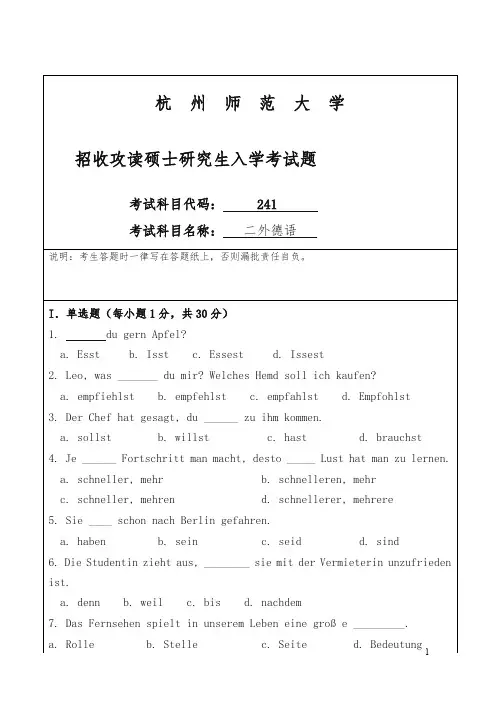

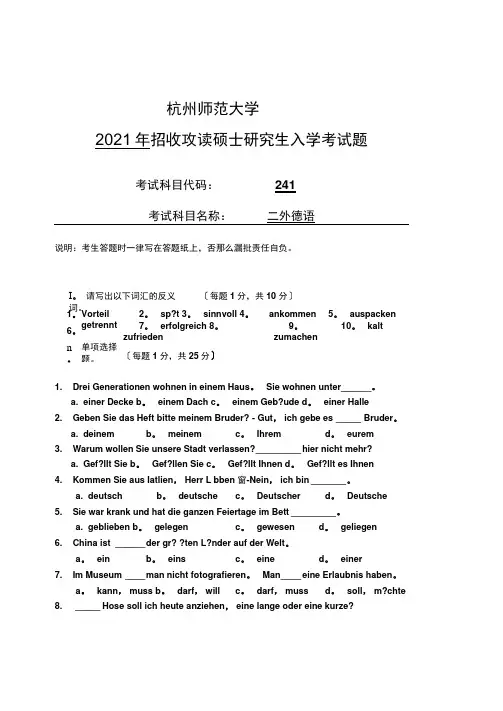
杭州师范大学 2021年招收攻读硕士研究生入学考试题考试科目代码:241 考试科目名称: 二外德语说明:考生答题时一律写在答题纸上,否那么漏批责任自负。
1. Drei Generationen wohnen in einem Haus 。
Sie wohnen unter ______。
a. einer Decke b 。
einem Dach c 。
einem Geb?ude d 。
einer Halle2. Geben Sie das Heft bitte meinem Bruder? - Gut , ich gebe es _____ Bruder 。
a. deinem b 。
meinem c 。
Ihrem d 。
eurem3. Warum wollen Sie unsere Stadt verlassen? _________ hier nicht mehr?a. Gef?llt Sie b 。
Gef?llen Sie c 。
Gef?llt Ihnen d 。
Gef?llt es Ihnen4. Kommen Sie aus Iatlien , Herr L bben 窗-Nein , ich bin _______ 。
a. deutsch b 。
deutsche c 。
Deutscherd 。
Deutsche 5. Sie war krank und hat die ganzen Feiertage im Bett _________ 。
a. geblieben b 。
gelegen c 。
gewesend 。
geliegen 6. China ist ______ d er gr? ?ten L?nder auf der Welt 。
a 。
ein b 。
eins c 。
eined 。
einer 7. Im Museum ____ m an nicht fotografieren 。
杭州师范大学2014年招收攻读硕士研究生入学考试题考试科目代码:243考试科目名称:二外英语说明:考生答题时一律写在答题纸上,否则漏批责任自负。
Part I Reading Comprehension(Skimming and Scanning)(2’*10=20’)Directions: In this part, you will have 15 minutes to go over the passage quickly and answer the questions on Answer Sheet.For questions I - 7, markY (for YES) if the statement agrees with the information given in the passage;N (for NO) if the statement contradicts the information given in the passage;NG(for NOT GIVEN) if the information is not given in the passage.For questions 8 - 10, complete the sentences with the information given in the passage.Will We Run Out of Water?Picture a “ghost ship” sinking into the sand, left to rot on dry land by a receding sea. Then imagine dust storms sweeping up toxic pesticides and chemical fertilizers from the dry seabed and spewing them across towns and villages.Seem like a scene from a movie about the end of the world? For people living near the Aral sea (咸海) in Central Asia, it’s all too real. Thirty years ago, government planners diverted the rivers that flow into the sea in order to irrigate (provide water for ) farmland. As a result, the sea has shrunk to half its original size, stranding (使搁浅) ships on dry land. The seawater has tripled in salt content and become polluted, killing all 24 native species of fish.Similar large-scale efforts to redirect water in other parts of the world have also ended in ecological crisis, according to numerous environmental groups. But many countries continue to build massive dams and irrigation systems, even though such projects can create more problemsthan they fix. Why? People in many parts of the world are desperate for water, and more people will need more water in the next century.“Growing populations will worsen problems with water,” says Peter H.Gleick, an environmental scientist at the Pacific Institute for studies in Development, Environment, and Security, a research organization in California. He fears that by the year 2025, as many as one-third of the world’s projected (预测的) 8.3 billion people will suffer from water shortages. WHERE WATER GOESOnly 2.5 percent of all water on Earth is freshwater, water suitable for drinking and growing food, says Sandra Postel, director of the Global Water Policy Project in Amherst, Mass. Two-thirds of this freshwater is locked in glaciers (冰山) and ice caps (冰盖). In fact, only a tiny percentage of freshwater is part of the water cycle, in which water evaporates and rises into the atmosphere, then condenses and falls back to Earth as precipitation (rain or snow).Some precipitation runs off land to lakes and oceans, and some becomes groundwater, water that seeps into the earth. Much of this renewable freshwater ends up in remote places like the Amazon river basin in Brazil, where few people live. In fact, the world’s population has access to only 12,500 cubic kilometers of freshwater--about the amount of water in Lake Superior(苏必利尔湖). And people use half of this amount already. “If water demand continues to climb rapidly,” says Postel, “there will be severe shortages and damage to the aquatic (水的) environment.”CLOSE TO HOMEWater woes (灾难) may seem remote to people living in rich countries like the United States. But Americans could face serious water shortages, too especially in areas that rely on groundwater. Groundwater accumulates in aquifers (地下蓄水层),layers of sand and gravel that lie between soil and bedrock. (For every liter of surface water, more than 90 liters are hidden underground.) Although the United States has large aquifers, farmers, ranchers, and cities are tapping many of them for water faster than nature can replenish(补充) it. In northwest Texas, for example, overpumping has shrunk groundwater supplies by 25 percent, according to Postel.Americans may face even more urgent problems from pollution. Drinking water in the United States is generally safe and meets high standards. Nevertheless, one in five Americans every day unknowingly drinks tap water contaminated with bacteria and chemical wastes, according to the Environmental Protection Agency. In Milwaukee, 400,000 people fell ill in 1993 after drinking tap water tainted with cryptosporidium (隐孢子虫),a microbe (微生物) that causes fever, diarrhea (腹泻) and vomiting.THE SOURCEWhere so contaminants come from? In developing countries, people dump raw (未经处理的) sewage(污水) into the same streams and rivers from which they draw water for drinking and cooking; about 250 million people a year get sick from water borne (饮水传染的) diseases.In developed countries, manufacturers use 100,000 chemical compounds to make a wide range of products.Toxic chemicals pollute water when released untreated into rivers and lakes. (Certain compounds, such as polychlorinated biphenyls (多氯化联二苯),or PCBs, have been banned in the United States.But almost everyone contributes to water pollution. People often pour household cleaners, car antifreeze, and paint thinners (稀释剂) down the drain; all of these contain hazardous chemicals. Scientists studying water in the San Francisco Bay reported in 1996 that 70 percent of the pollutants could be traced to household waste.Farmers have been criticized for overusing herbicides and pesticides, chemicals that kill weeds and insects pollute water as well. Farmers also use nitrates, nitrogen--rich fertilizer that helps plants grow but that can wreak havoc (大破坏) on the environment. Nitrates are swept away by surface runoff to lakes and seas. Too many nitrates “over enrich” these bodies of water, encouraging the buildup of algae, or microscopic plants that live on the surface of the water. Algae deprive the water of oxygen that fish need to survive, at times choking off life in an entire body of water.WHAT’S THE SOLUTION?Water expert Gleick advocates conservation and local solutions to water-related problems. Governments, for instance, would be better off building small-scale dams rather than huge and disruptive projects like the one that ruined the Aral Sea.“More than 1 billion people worldwide don’t have access to basic clean drinking water,” says Gleick, “There has to be a strong push on the part of everyone--governments and ordinary people--to make sure we have a resource so fundamental to life.”1. That the huge water projects have diverted the rivers causes the Aral Sea to shrink.2. The construction of massive dams and irrigation projects does more good than harm.3. The chief causes of water shortage are population growth and water pollution.4. The problems Americans face concerning water are ground water shrinkage and tap water pollution. 5. According to the passage all water pollutants come from household waste.6. The people living in the United States will not be faced with water shortages.7. Water expert Gleick has come up with the best solution to water-related problems.8. According to Peter H. Gleick, by the year 2025, as many as ___________of the world’s people will suffer from water shortages.9. Two thirds of the freshwater on Earth is locked in ___________ .10. In developed countries, before toxic chemicals are released into rivers and lakes, they should be treated in order to avoid ___________.Part II Vocabulary and Structure(1’*30=30’)Directions:Choose the best answer you think fit to fill in the gaps of each sentence with the items given. Please write down the corresponding letter on Answer Sheet.11. In the advanced course students must take performance tests at monthly _________.A) gaps B) intervals C) length D) Distance12. I really don’t know how to _____ the problem.A) cope B) deal C) tackle D) dispose13. He smokes _____ of ten cigarettes a day.A) on the average B) on an average C) on average D) up to the average14. Don't drive so fast. You will be fined if you ______ the speed limit.A) break B) reject C) suspend D) exceed15. Infections can be ______if not treated early enough.A) fatal B) excessive C) radical D) exaggerated16. Many people take________ radios to the beach with them.A) liable B) purchasable C) comfortable D) portable17. Now many people buy __ Christmas trees instead of real ones.A) false B) fake C) sham D) artificial18. __ to the question of refreshments, I should think lemonade and sandwiches will be enough.A) Prior B) As C) Due D) According19. The synthetic vitamins are identical _____ those naturally present in our food.A) for B) of C) as D) with20. Information gathered by sensors is ________to the control center’s computer.A) transacted B) transmitted C) radiated D) transferred21. Let us work in _______ with our friends.A) corporation B) coordination C) cooperation D) coincidence22. I think the _______ thing to do is phone before you go and ask for directions.A) sensible B) sensitive C) sensory D) sensational23. You shouldn’t make him _______ the tricky task. He is not experienced enough.A) take away B) take on C) take in D) take to24. The poor reception of your TV is probably due to outside _______.A) interference B) interruption C) intervention D) interception25. I’d _______ his reputation with other farmers and business people in the community, and thenmake a decision about whether or not to approve a loan.A) take into account B) account for C) make up for D) make out26. The wealth of a country should be measured_______the health and happiness of its people aswell as the material goods it can produce.A) in line with B) in terms of C) in regard with D) by means of27. Woodrow Wilson_______to preserve world peace by supporting the establishment of anorganization to settle international disputes.A) succeeded B) endeavored C) engaged D) enforced28. When several people apply for the same job,_______is usually given to whoever has betterqualifications.A) superiority B) inferiority C) priority D) minority29. Several emergency measures were taken to_______the financial pressure on the government.A) eliminate B) alleviate C) reverse D) upgrade30. Nobody_______when I complained about the food, so nothing was done about it.A) turned to me B) relied on me C) backed me up D) held me up31. All the students _______ a loud laugh when the teacher told them the joke.A) let off B) let down C) let out D) let up32. In his speech the Minister of Industry said that industrial exports went up for three _______years.A) successful B) successive C) continual D) continuous33. She _______ her career after an interval of six years.A) assumed B) presumed C) resumed D) consumed34. He received a _______wound soon after the battle began, and died two days later in ahospital.A) mortal B) moral C) slight D) severe35. He would rather do anything _______ prepare for the test.A) other than B) more than C) better than D) less than36. I would have accompanied you to the cinema yesterday, but I _______ no time.A) had had B) could have had C) might have had D) had37. His proposal that the Air Force _______ the UFO sighting was approved by the commissionand referred to the appropriate committee.A) had investigated B) was investigating C) investigate D) investigated38. _______ nothing more to discuss, the CEO got to his feet, said goodbye and left the meetingroom.A) There was B) Being C) There being D) As therebeing39. Only if I can understand what you are listening to _______ write it down correctly.A) I shall B) shall I C) I can D) can I40. The foreign guests, _______ were scientists, were warmly welcomed at the train station.A) most of them B) most of whom C) most of that D) most of those杭州师范大学2015年招收攻读硕士研究生入学考试题考试科目代码:243考试科目名称:二外英语说明:考生答题时一律写在答题纸上,否则漏批责任自负。